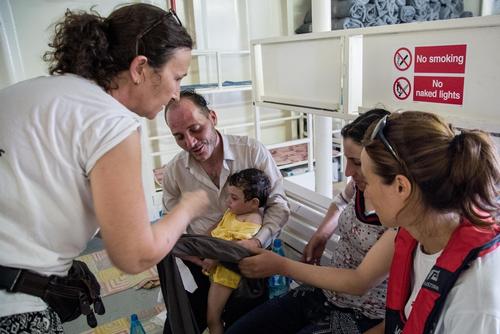On 5 August 2015, a wooden boat carrying around 600 people capsized 22 kilometres (14 miles) off the Libyan coast. An Irish vessel was the first on the scene and started rescue operations, with Médécins Sans Frontières (MSF) search and rescue ship Dignity I arriving shortly afterwards. The MSF team provided medical treatment to 10 people, including five who had to be evacuated by helicopter. Below, a couple of the 300 people thought to have survived recount their experiences:
Mohammed, Diana and Azeel, from Palestine
In the hospital area on-board Dignity I, Mohammed clutches his one-year-old daughter Azeel to his chest. He says, “I can swim, but she can’t … and how could I grab her from the water when all the other people were trying to stay afloat?” Luckily, he was able to reach out and pull Azeel out of the sea. His wife, Diana, also survived but is confused and in a state of shock. She is in need of urgent medical attention, and the whole family will be evacuated to the Italian coast where they can receive the proper treatment.
This Palestinian family are still traumatised by the event and cannot comprehend what happened. “The boat was having problems after we left Libya, and we had to get rid of the water in the engine room. Afterwards things seemed to get better, and the sea was calm. Then, suddenly, the boat started rocking and we realised we were sinking.” When Dignity I arrived at the spot where the boat had been, there was nothing left but floating debris.
Mohammed and his family had been living in Libya but decided to leave because of the war. “Libya is divided between rebels and militia. There is no future for us there, for our daughter. We were treated like the worse kind of humans in Libya and people abused us. We needed to flee.”
Alea, Mohammed and Dana, from Syria
Alea is shaking as she is helped on-board Dignity I. She can barely keep her emotions in check, she is so shocked and terrified by the tragedy she has just witnessed.
“I was inside the ship when it started sinking” she reveals minutes later, after calming down a little. Her husband Mohammed who is with her is clothed only in his underwear and is soaked to the bone: he rescued his wife from the water. “I was sure that was the end of me. He saved my life.” But their baby may not have survived the journey.
At five months pregnant Alea is worried, as for the last week she has not felt her baby move. In the hospital area of the boat, the MSF midwife carefully settles Alea on the bed. In the corner stands Dana, a 17 year old from Damascus who was also on the boat and is a friend of the family. She smilingly translates the midwife’s questions from English to Arabic.
Alea and her husband were desperate to leave Libya after she fell pregnant. They could not access healthcare because they could not afford a private hospital and the public ones were reserved for Libyans. It was in Libya that the couple met Dana, who was also fleeing the war in her hometown of Damascus. “I was so tired of seeing death and blood every day” she says. Dana and her 65-year-old father undertook the lengthy and dangerous journey to Turkey, but could not move on to Greece because of the long walk involved. Instead, they caught a plane from Turkey to Libya and then embarked on the boat. She falls quiet at this point in her story, silenced by the memory of what happened next.
The quiet in the room is suddenly broken, however, by the sound of a small heartbeat, very soft at first and then growing louder.



